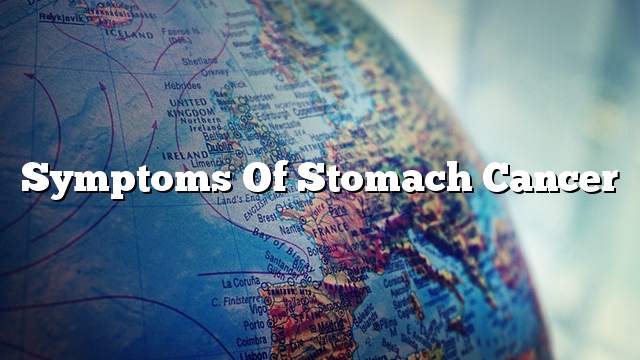stomach cancer
The stomach is the main reservoir of food, and if it is not the capacity of storage to be forced to eat all the time instead of eating a few times a day, in addition to it produces a mixture of acid and mucus and digestive enzymes that digest and sterilize food after swallowing.
Gastric cancer is a malignancy that originates from the lining of the stomach, and stomach cancer in its early stages is often preceded by ulcers, pain and minor infections. It is the third largest in the world in terms of the number of deaths. In 2012, the World Health Organization (WHO) status.
Gastric cancer is difficult to treat because most patients are diagnosed with advanced stages of the disease. On the other hand, there has been a significant decline in the number of stomach cancer in the past half century, where it was considered the second globally in the number of injuries, but now ranks fourth after lung cancer, breast and colon.
The most common type of cancer is called adenocarcinoma, which accounts for about 90% to 95% of all stomach cancers. Other forms of stomach cancer include tumors in the lymph nodes.
Gastric cancer is usually treated if detected at an early stage, but if it is detected at an advanced stage, the recovery rate unfortunately is very small, and in a large number of cases is detected in its advanced stages.
Symptoms of stomach cancer
Usually there are no early symptoms of stomach cancer and if they appear to be general and vary from person to person depending on the type of cancer cells and location of cancer in the stomach, but in general may include:
Note: These symptoms may be similar to the symptoms of other diseases, such as stomach ulcers, so you should visit your doctor to determine the exact diagnosis.
Advanced symptoms of stomach cancer
There are a range of symptoms that indicate the progress of the disease, including:
- Discomfort in the upper and middle area of the abdomen.
- The presence of blood in the stool, where the color of the stool near the color of black.
- Evaporation, may be with or without blood.
- Loss of weight.
- Pain in the stomach after eating.
- Tiredness and fatigue in the body in general.
- Bulges and stomach gases.
Causes and factors of stomach cancer
The main cause of stomach cancer is unknown, but there are a number of factors contributing to the likelihood of infection, including:
- Sex : The risk of infection in men is weaker than that of women.
- Ethnicity : People of African and Asian descent are more vulnerable than others.
- Genetics : There is a significant relationship when there are previous cases of infection in the same family.
- Age : The higher the age, the greater the risk of infection.
- Lifestyle : Smoking, drinking alcohol, the nature of meals, and food eaten by a person, especially fast food, food containing preservatives, and avoiding eating vegetables and fruits rich in vitamins, all have a significant relationship to increased risk of stomach cancer.
Diagnosis of stomach cancer
Diagnosis of gastric cancer is done by the same specialist, and the diagnosis is divided into two parts:
- Clinical examination: Where the doctor may find inflation in the lymph nodes, or hypertrophy in the liver, or a pool of water in the abdomen, or a lump in the stomach area.
- Medical examinations:
- X-rays of the esophagus, stomach, intestines, accompanied by drinking solution of barium.
- Endoscopy.
- If cancer is detected in the stomach, other tests, such as stratification, and other tests are performed.
Cure stomach cancer
Treatment is done through:
- Surgery to remove the tumor.
- Chemotherapy.
- Radiotherapy.
- Modern Immunotherapy.
Gastric cancer occasionally affects the affected person without any initial symptoms, such as ulcers and pain. The cancer of the stomach of cancer is fast spreading, it is in the stomach until it begins to spread to everything that can stick to it, intestines, esophagus, liver, pancreas, and sometimes may reach the lungs.
Avoid the risk of stomach cancer
The risk of stomach cancer can be avoided by a variety of things, including:
- Eating too much fresh and unprocessed foods, and eating too many fruits and vegetables. According to the American Cancer Society, it is recommended to eat at least two and a half cups of vegetables and fruits a day and eat salad every day.
- A number of studies recommend eating more foods rich in vitamins, such as: vitamin C, vitamin A, vitamin E.
- Weight loss, as there are a number of studies linking weight gain to an increased risk of stomach cancer.
- Exercise daily and regularly.
- Stay away from smoking or anagles, as they increase the risk of stomach cancer.
- If a person has H. pylori infection, he or she should be treated, as they may be at risk of stomach cancer.
- If there is a family history of gastric cancer, the doctor’s regular visit should not be neglected to ensure that there are no signs or symptoms of stomach cancer. Early detection has a major role in treatment.
